新闽教版小学英语六年级上册一般过去时易错题解析
2021到2022年闽教版六年级英语毕业考必错易错题
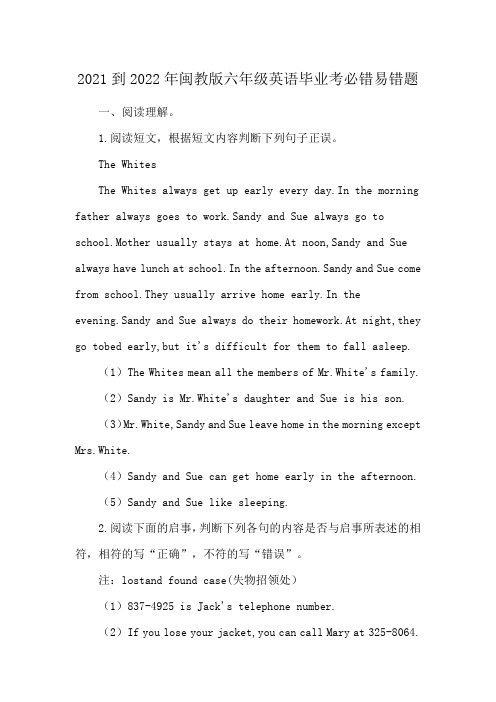
2021到2022年闽教版六年级英语毕业考必错易错题一、阅读理解。
1.阅读短文,根据短文内容判断下列句子正误。
The WhitesThe Whites always get up early every day.In the morning father always goes to work.Sandy and Sue always go to school.Mother usually stays at home.At noon,Sandy and Sue always have lunch at school.In the afternoon.Sandy and Sue come from school.They usually arrive home early.In theevening.Sandy and Sue always do their homework.At night,they go tobed early,but it's difficult for them to fall asleep.(1)The Whites mean all the members of Mr.White's family.(2)Sandy is Mr.White's daughter and Sue is his son.(3)Mr.White,Sandy and Sue leave home in the morning except Mrs.White.(4)Sandy and Sue can get home early in the afternoon.(5)Sandy and Sue like sleeping.2.阅读下面的启事,判断下列各句的内容是否与启事所表述的相符,相符的写“正确”,不符的写“错误”。
注:lostand found case(失物招领处)(1)837-4925 is Jack's telephone number.(2)If you lose your jacket,you can call Mary at 325-8064.(3)Jack wants to know whose camera it is.(4)David is a primary school student.(5)If you pick up Jim's library card,you can tell him on the Internet.3.阅读短文,判断正误。
【英语】英语一般过去时易错剖析及解析

【英语】英语一般过去时易错剖析及解析一、初中英语一般过去时1.—Have you seen my brother?—Yes. I _____ him in the library five minutes ago.A. metB. have metC. meetD. have been met【答案】 A【解析】【分析】句意:---你看到我哥哥了吗?---是的,我五分钟前在图书馆遇到他了。
ago是一般过去时的标志,故答案为A。
【点评】考查动词的时态,理解句子,根据句中的时间状语判断时态。
2.—Linda is not coming for the party tonight.—But she _.A. promisesB. promisedC. will promiseD. had promised【答案】 B【解析】【分析】句意:——琳达今晚不会来聚会。
——但是她答应了啊。
根据前一句可知“她答应”发生在说话之前,故用一般过去时,因此选B。
【点评】考查动词的时态。
3.— Where did you go last weekend?— I to the Great Wall.A. goB. wentC. will goD. have gone【答案】B【解析】【分析】句意:——上个周末你去哪里了?——我去长城了。
A,go一般现在时。
B,went一般过去时C,will go一般将来时。
D,have gone现在完成时。
据时间状语last weekend可知此处用一般过去时,故用动词的过去式went。
故选B。
【点评】本题考查一般过去时。
以及go、went、will go、have gone四种事态的用法和区别。
4.Mark Zuckerberg, founder of Facebook, _____ _________to donate a lot of money to charity when his daughter was born.A. decidesB. has decidedC. had decidedD. decided【答案】 D【解析】【分析】句意:当脸书的创始人——马克·扎克伯格的女儿出生的时候,他决定把很多钱捐给慈善事业。
小学六年级英语上册错题解析(附例题及答案).doc
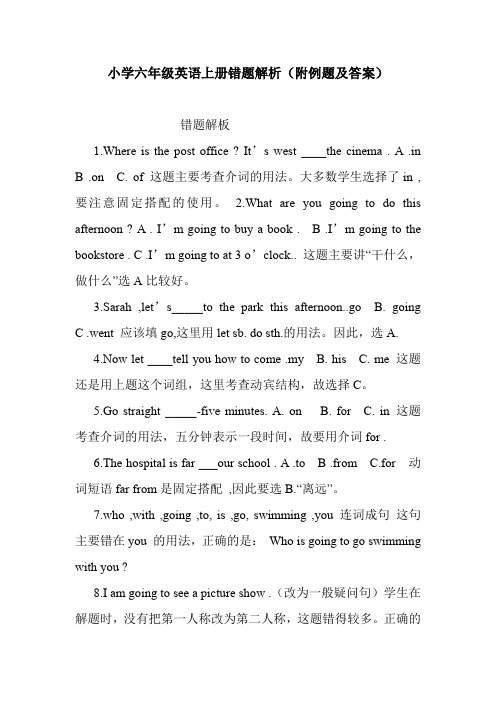
小学六年级英语上册错题解析(附例题及答案)错题解板1.Where is the post office ? It’s west ____the cinema . A .inB .on C. of 这题主要考查介词的用法。
大多数学生选择了in ,要注意固定搭配的使用。
2.What are you going to do this afternoon ? A . I’m going to buy a book . B .I’m going to the bookstore .C .I’m going to at 3 o’clock.. 这题主要讲“干什么,做什么”选A比较好。
3.Sarah ,let’s_____to the park this afternoon..go B. goingC .went 应该填go,这里用let sb. do sth.的用法。
因此,选A.4.Now let ____tell you how to come .my B. his C. me 这题还是用上题这个词组,这里考查动宾结构,故选择C。
5.Go straight _____-five minutes. A. on B. for C. in 这题考查介词的用法,五分钟表示一段时间,故要用介词for .6.The hospital is far ___our school . A .to B .from C.for 动词短语far from是固定搭配,因此要选B.“离远”。
7.who ,with ,going ,to, is ,go, swimming ,you 连词成句这句主要错在you 的用法,正确的是:Who is going to go swimming with you ?8.I am going to see a picture show .(改为一般疑问句)学生在解题时,没有把第一人称改为第二人称,这题错得较多。
闽教版小学英语六年级三大时态(一般现在时、一般过去时、一般将来时..
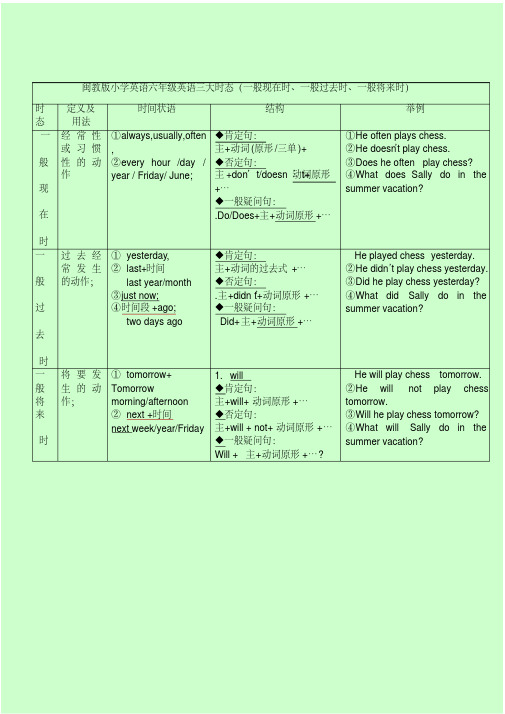
闽教版小学英语六年级英语三大时态(一般现在时、一般过去时、一般将来时)时态定义及用法时间状语结构举例一般现在时经常性或习惯性的动作①always,usually,often,②every hour /day /year / Friday/ June;◆肯定句:主+动词(原形/三单)+◆否定句:主+don’t/doesn’t+动词原形+…◆一般疑问句:.Do/Does+主+动词原形+…①He often plays chess.②He doesn’t play chess.③Does he often play chess?④What does Sally do in thesummer vacation?一般过去时过去经常发生的动作;①yesterday,②last+时间last year/month③just now;④时间段+ago;two days ago◆肯定句:主+动词的过去式+…◆否定句:.主+didn’t+动词原形+…◆一般疑问句:Did+主+动词原形+…He played chess yesterday.②He didn’t play chess yesterday.③Did he play chess yesterday?④What did Sally do in thesummer vacation?一般将来时将要发生的动作;①tomorrow+Tomorrowmorning/afternoon②next +时间next week/year/Friday1.will◆肯定句:主+will+动词原形+…◆否定句:主+will + not+动词原形+…◆一般疑问句:Will + 主+动词原形+…?He will play chess tomorrow.②He will not play chesstomorrow.③Will he play chess tomorrow?④What will Sally do in thesummer vacation?一、选择题( ) 1.Ben usually at 6:40. A.got up B.get up C.gets up ( ) 2.In the past my mother my bed. A.make B.made C.makes ( ) 3.Where you in the summer vacation?A.areB.isC.were( ) 4.Did you a good time in the USA?’tA.have; Yes,I didB.had; Yes,I didC.have; No,I don( ) 5.Do you often do housework at home?A.Yes,I does.B.No,I don’t.C.Yes,I am.( ) 6.Does he clean his room now?’t.A.Yes,she does.B.Yes,he does.C.No,he don( ) 7.li Hong usually at 6:30 in the morning.But this morning she at 7:00.A. get;gotB. gets;getC.gets;got( ) 8. How Mike go to school every day?A.doB.isC.doesD.are( ) 9. The students the football match now.A.watchB.to watchC.are watchingD.watching( ) 10. Did you your room yesterday?A.cleanB.cleansC. cleanedD.cleaning二、填空题1.Listen,there are many students (sing)in the classroom.2.. Look! Sarah is (dance).3. My mother often (wash)clothes on the weekends.4. He (buy) a present for his mother yesterday.5. John (visit)Qingdao next Sunday.6.He usually____(go) to school on foot.7.Does she_____(go) to school on foot?8.Did she ____(go) to school on foot?9.They_____(go) to school on foot yesterday.10.____ she going to school on foot?助动词do,does,did或者它们的否定形式的使用1) you like this magazine?2) The girl like bread for breakfast.3) ---What she at the weekends?---She usually plays games with her friends.4) ---What you do last Sunday? ---I wrote to my friend.5) -- He not visit a farm last National Day holiday.6) They not like playing volleyball.7) --- Jim have a picnic with his family every Saturday?---Yes, he8) Helen with Yang Ling go to school by bike every day? 9) [Do/Does]______ you go to school everyday? No, I don’t. 10) [Do/Does]______ Jack and Peter like apples?11)[Do/Does]______ he watch TV at night? Yes he does. 三.连词成句(请注意大小写)1. the summer you where were in vacation2.did do yesterday what youA good did have time the you in a4. Wang Tao his yesterday did make bed?5. does often housework home Sally at do6.will where you for the go holidays7. to bookstore yesterday he went the.。
六年级英语一般过去时讲解与练习

六年级(Ji)英语一般过去时讲解与练习1.一般过去时表示过去某个时间发生的动作或存在的状态,常和表示过去的时间状语连用。
一般过去时也表示过去经常或反(Fan)复发生的动作。
2.Be动词在一般过去时(Shi)中的变化:⑴am 和is在一般(Ban)过去时中变为was。
(was not=wasn’t)⑵are在一般过(Guo)去时中变为were。
(were not=weren’t)⑶带有was或were的句(Ju)子,其否定、疑问的变化和is, am, are一样(Yang),即否定句在was或were后加not,一般疑问句把was或were调到句首。
3.句中没(Mei)有be动词的一般过去时的句子否定句:didn’t +动词原形,如:Jim didn’t go home yesterday. 一般疑问句:在句首加did,句子中的动词过去式变回原形。
如:Did Jim go home yesterday?特殊疑问句:⑴疑问词+did+主语+动词原形?如:What did Jim do yesterday? ⑵疑问词当主语时:疑问词+动词过去式?如:Who went to home yesterday? 动词过去式变化规则:1.一般在动词末尾加-ed,如:play-played, cook-cooked2.结尾是e加d,如:taste-tasted3.末尾只有一个元音字母和一个辅音字母的重读闭音节,应双写末尾的辅音字母,再加-ed,如:stop-stopped4.以“辅音字母+y”结尾的,变y为i,再加-ed,如:study-studied 5.小学常用不规则动词过去式:am,is-was, are-were, do-did, see-saw, say-said, give-gave, get-got, go-went, have-had, eat-ate, take-took, run-ran, sing-sang, put-put, make-made, read-read, write-wrote, draw-drew, drink-drank, fly-flew, ride-rode, speak-spoke, sweep-swept, swim-swam, sit-sat一.用be动词的适当形式填空1. We __________ students five years ago.2. Patti and I __________ good friends.3. Today __________ Tuesday, Yesterday __________ Monday.4. Sue __________ on the slide a moment ago.5. Where is my hat? It _______ on the desk just now.二.单项选择:从下列各题后所给的四个选项中选择最佳答案填空。
六年级英语一般过去时讲解与练习
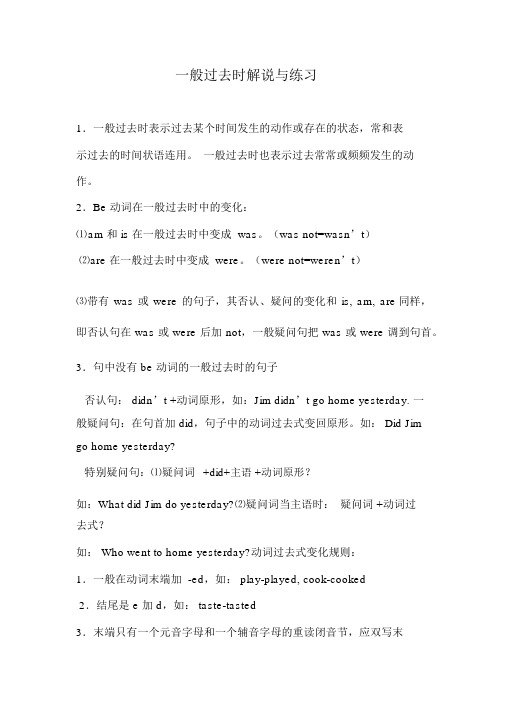
一般过去时解说与练习1.一般过去时表示过去某个时间发生的动作或存在的状态,常和表示过去的时间状语连用。
一般过去时也表示过去常常或频频发生的动作。
2.Be 动词在一般过去时中的变化:⑴a m 和 is 在一般过去时中变成 was。
(was not=wasn’t)⑵are 在一般过去时中变成 were。
(were not=weren’t)⑶带有was 或were 的句子,其否认、疑问的变化和is, am, are同样,即否认句在 was 或 were 后加 not,一般疑问句把 was 或 were 调到句首。
3.句中没有 be 动词的一般过去时的句子否认句: didn’t +动词原形,如:Jim didn’t go home yesterday. 一般疑问句:在句首加 did,句子中的动词过去式变回原形。
如: Did Jimgo home yesterday?特别疑问句:⑴疑问词+did+主语 +动词原形?如:What did Jim do yesterday?⑵疑问词当主语时:疑问词 +动词过去式?如: Who went to home yesterday?动词过去式变化规则:1.一般在动词末端加 -ed,如: play-played, cook-cooked2.结尾是 e 加 d,如: taste-tasted3.末端只有一个元音字母和一个辅音字母的重读闭音节,应双写末尾的辅音字母,再加 -ed,如: stop-stopped4.以“辅音字母 +y”结尾的,变 y 为 i,再加 -ed,如:study-studied 5.小学常用不规则动词过去式:am,is-was, are-were, do-did, see-saw, say-said, give-gave, get-got, go-we nt, come-came, have-had, eat-ate, take-took, run-ran, sing-sang, put-put, make-made, read-read, write-wrote, draw-drew, drink-drank, fly-flew, rid e-rode, speak-spoke, sweep-swept, swim-swam, sit-sat一.用 be 动词的适合形式填空1.We __________ students five years ago.2.Patti and I __________ good friends.3.Today __________ Tuesday, Yesterday __________ Monday.4.Sue __________ on the slide a moment ago.5.Where is my hat? It _______ on the desk just now.二.单项选择:从以下各题后所给的四个选项中选择最正确答案填空。
闽教版小学英语六年级上册知识点(课文解读)
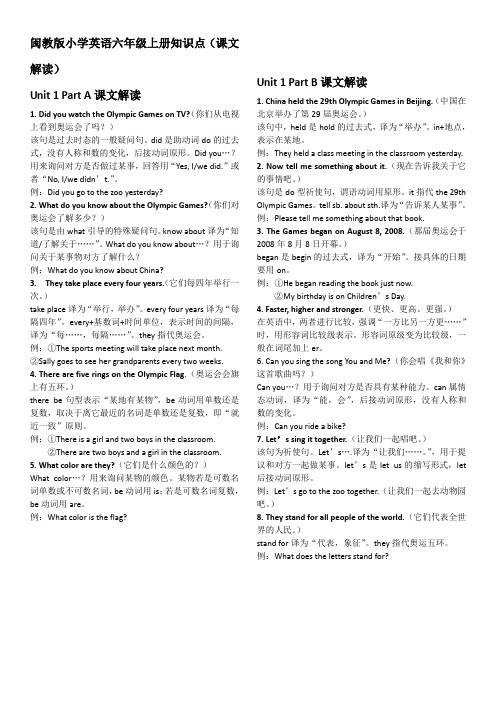
闽教版小学英语六年级上册知识点(课文解读)Unit 1 Part A课文解读1. Did you watch the Olympic Games on TV?(你们从电视上看到奥运会了吗?)该句是过去时态的一般疑问句。
did是助动词do的过去式,没有人称和数的变化,后接动词原形。
Did you…?用来询问对方是否做过某事,回答用“Yes, I/we did.”或者“No, I/we didn’t.”。
例:Did you go to the zoo yesterday?2. What do you know about the Olympic Games?(你们对奥运会了解多少?)该句是由what引导的特殊疑问句。
know about译为“知道/了解关于……”。
What do you know about…?用于询问关于某事物对方了解什么?例:What do you know about China?3. They take place every four years.(它们每四年举行一次。
)take place译为“举行,举办”。
every four years译为“每隔四年”。
every+基数词+时间单位,表示时间的间隔,译为“每……,每隔……”。
they指代奥运会。
例:①The sports meeting will take place next month.②Sally goes to see her grandparents every two weeks.4. There are five rings on the Olympic Flag.(奥运会会旗上有五环。
)there be句型表示“某地有某物”,be动词用单数还是复数,取决于离它最近的名词是单数还是复数,即“就近一致”原则。
例:①There is a girl and two boys in the classroom.②There are two boys and a girl in the classroom.5. What color are they?(它们是什么颜色的?)What color…?用来询问某物的颜色。
(英语)英语一般过去时易错剖析含解析

【解析】
【详解】
考查时态。句意:—你好,我听说你在度假。—不是这样的,我已经从雅典度假回来了,我在那里待了两个星期。根据句意可知,我已经回来,所以用现在完成时have returned。根据语境,stay这个动作已经结束,表示过去发生的动作,所以第二空用一般过去时。故B选项正确。
14.Wolf Warrior 2, which ________ the “Award for Best Visual Effects” at the Beijing Film Festival, indicates China's film industry has come of age.
例句:Only then did he realize the importance of English.
考点:考查倒装句
17.—Is Peter coming?
—No, he____ his mind after a phone call at the last minute.
A.changesB.changed
—Since last month when I ________ from a heart attack.
A.recoveredB.have recovered
C.was recoveringD.would recover
【答案】A
【解析】
【详解】
考查时态。句意:——你步行上班已经多长时间了?——自上个月我心脏病康复开始。last month是过去的的时间点,应该与过去时连用,when引导定语从句,指代last month,指上个月我从心脏病康复。用一般过去时。故选A。
—Well, Cathy ________ it to me during lunch.
2021年小学六年级英语上册错题解析(附例题及答案)
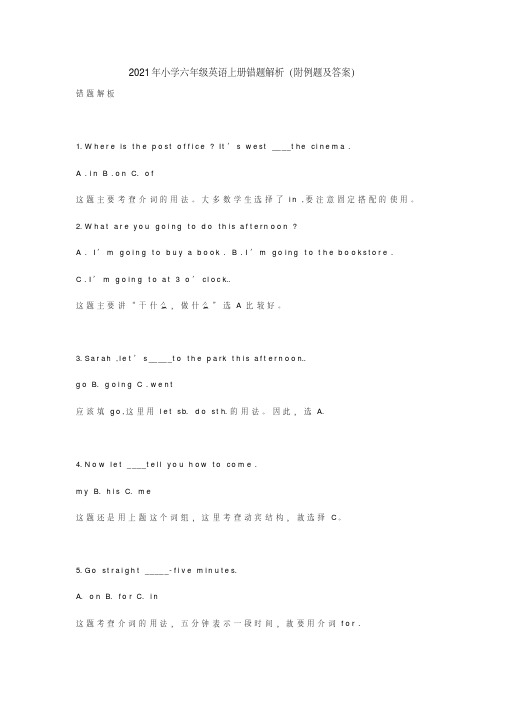
2021年小学六年级英语上册错题解析(附例题及答案)错题解板1.W h e r e i s t h e p o s t o f f i c e?I t’s w e s t____t h e c i n e m a .A .i nB .o n C.o f这题主要考查介词的用法。
大多数学生选择了i n,要注意固定搭配的使用。
2.W h a t a r e y o u g o i n g t o d o t h i s a f t e r n o o n?A .I’m g o i n g t o b u y a b o o k .B .I’m g o i n g t o t h e b o o k s t o r e .C .I’m g o i n g t o a t3o’c l o c k..这题主要讲“干什么,做什么”选A比较好。
3.Sa r a h,l e t’s_____t o t h e p a r k t h i s a f t e r n o o n..g o B.g o i n g C .w e n t应该填g o,这里用l e t s b.d o s t h.的用法。
因此,选 A.4.N o w l e t____t e l l y o u h o w t o c o m e .m y B.h i s C.m e这题还是用上题这个词组,这里考查动宾结构,故选择C。
5.G o s t r a i g h t_____-f i v e m i n u t e s.A.o nB.f o rC.i n这题考查介词的用法,五分钟表示一段时间,故要用介词f o r .6.T h e h o sp i t a l i s f a r___o u r s c h o o l .A .t oB .f r o m C.f o r动词短语f a r f r o m是固定搭配,因此要选 B.“离······远”。
六年级 上学期 英语 闽教版(三起点) 一般过去时的概念及用法

一般过去时的概念及用法一、基本概念一般过去时(simple past tense)表示过去某个时间里发生的非持续性动作或存在的状态,也表示经常或反复发生的动作。
用动词的过去式表示,常和表示过去的时间状语连用,如:yesterday,last night,in 1990,two days ago,before,the age of等。
一般过去时也表示过去经常或反复发生的动作,常和often,always等表示频率的时间状语连用。
表示过去习惯性、经常性的动作、行为;过去主语所具备的能力和性格。
二、动词变化1.直接加ed: work—— worked look——looked2.以不发音e结尾的单词,直接加d: live ——lived hope——hoped use——used3.以辅音字母+y结尾的,变y为i加ed: study—— studied carry——carried worry——worried4.以一个辅音字母结尾的,双写最后的辅音字母+ed: stop——stopped plan——planned重读闭音节体现形式为辅-元-辅结构,例如nod, n为辅音,o为元音,d为辅音。
5. 以ic结尾的动词,要把ic变成ick再加ed,如picnic→picnicked,traffic→trafficked6.不规则变化的动词过去式:have---had are---were get---got say---said feel---feltdo/does---did is---was go---went drink--drank eat--ate bring----brought think----thought buy----bought catch---- caught teach ---- taught sit----sat wear----wore cut----cut sweep----swept sleep——slept see----saw become----became read——read7.以辅元辅结尾的加d三、用法(1)一般过去时表示在过去某个特定时间发生,也可以表示过去习惯性、经常性的动作。
最新闽教版小学英语六年级上册一般过去时易错题解析

一般过去时易错点解析例1 用括号内动词的适当形式填空I went to the supermarket and (buy) some fruit.解析:很多同学在做本题时,由于没有找到时间状语,因而不知道应该填什么。
句中的and连接了两个并列句,前后时态应该一致,前面用了go的过去时went,所以后面buy也应该用过去时bought.答案:bought例2 用括号内动词的适当形式填空。
He always (play)computer games last year.解析:有些人会把答案写成plays,虽然主语He是单数第三人称,而且句子中出现了always,但是当你读完整个句子就会发现last year,所以应该用过去时played.一般过去时也可以表示过去经常做某事。
答案:played例3用括号内动词的适当形式填空。
Our teacher said that the earth (move) round the sun.解析:本题是一道难题。
小学阶段很少涉及,但对于学习成绩较好的学生是可以尝试一下的。
本句是含有宾语从句的主从复合句。
主句的谓语动词said是say 的过去式,有的同学可能会填moved,但是从句the earth moves round the sun(地球绕着太阳转)是客观真理,所以还是要用一般现在时。
答案:moves例4句型转换。
Miss Green taught us English last year.(变一般疑问句)解析:本题有的同学可能会写成:Did Miss Green taught you English last year?要注意,如果变一般疑问句时提前了Did,则原句中的实意动词要恢复成原形。
可记住如下口诀:“见助动,周原形”。
答案:Did Miss Green teach you English last year?例5单项选择。
( )There a pen and two books on the desk yesterday.A is B.are C was D were解答:由yesterday可知本题应该选择过去时,可排除A和B。
一般过去时易错题及解析

般过去时易错题及解析一、单项选择一般过去时1. ___________________________________________________________ .Jessica had intended to go bungee jumping, but on second thoughts, she _________ the plan.A.was canceling B.cancelsC.canceled D.has canceled【答案】 C【解析】【详解】考查动词时态。
句意:Jessica本打算去蹦极的,然后她想了想,又取消了该计划。
由前半句“ had intended to 可知前半句的时态为过去完成时,表示过去的过去,因此后半句为一”般过去时,表示“取消计划”这一动作发生在“打算去蹦极”之后。
故正确答案为C。
2.—That must have been a hard project?—Yeah, it __ us a whole year to finish the work.A.took B.has takenC.takes D.was taking【答案】 A【解析】考查时态。
That must have been ♦•是对过去情况的判断,所以it us a wholeweek to get there. 是在陈述过去的一个事件,要用过去时。
句意:那一定是很长的旅程。
是的,我们花了一周才到。
选A。
【名师点睛】时态题的考查关键是抓住句子的上下文含义和句中的时间状语。
要根据时间状语来选择合适的时态,在平时的学习中要注意积累有关时态的用法和各种时态的特殊之处。
这句话的解题关键是That must have been a long trip. 说明是对过去事情的推测。
3. ____________________ .The young couple as volunteer teachers for a whole year during their stay in Yunnan.A.have worked B.had workedC.worked D.have been working【答案】 C【解析】【详解】考查时态。
六年级上册英语专项练习一般过去时讲解与练习-精选文档

一般过去时知识点讲解(一)一、含义:指已经发生过的动作或事件,至今为止这个动作或事件已经停止。
She(be)not at home last night. 她昨晚八点没在家。
I (go)to school at 7:00 yesterday morning. 我昨天早晨七点去上学。
二、四种时间状语①,yesterday及相关短语。
例如:yesterday morning/afternoon/evening 昨天上午吓午/晚上。
②“last+时间状语”构成的短语。
例如:last night/month/spring/ye . ar昨晚/上个月/去年春天/去年。
③“一段时间+ago”组成的短语。
例如:three days ago 三天以前four years ago 四年以前。
④“介词+时间名词”组成的短语。
例如:in 2019 在2019 年;on the morning of December 25th 在12 月25 号早上。
选择题( )1.Her hair short and her eyes big.A.was ;wereB.were;wasC. were; were( )2.We to the Great Wall yesterday.A. goB. wentC.goes( )3.What did you for breakfast this morning?A. haveB. hasC.had( )4.I had some and for breakfast.A.bread;milkB. breads;milksC. breads;milk( )5.What did you do on your holiday? I .A.bought a presentB.goes skiingC.learning English( )6.Sandy often his homework on Sundays.A.doB.doesC.did用所给的词的适当形式填空1.He (visit)the Great Wall last year.2. he (fly)a kite last Sunday? Yes, he .1.1n China, people like (eat) dumplings.4.Kitty (not go) to school yesterday.5.Lily (want)to go to school in 2019.一般过去时知识点讲解(二)动词的过去式:1) be 动词的过去式:am / is- was, are-were用“am , is , wasM 空1.I a teacher now. But ten years ago I a student.2.He a little boy five years ago.3.Wher e it last Sunday?4.She!at school yesterday.2)行为动词过去式的“规则”变化:① 一般动词,在词尾直接加ed,如:100k一looked, work—worked②以不发音的e结尾的动词,直接加d,如:like—liked, live—lived③以辅音字母+y结尾的动词,变y为i,再加ed,如:studyf studied, cry—cried④双写末尾字母,再力口ed,如:stop-stopped, plan (计戈U) — planned, shop-shopped3)行为动词过去式的“不规则”变化:而不规则动词的过去式则需认真下工夫去记了,例如:go-went; come-came; buy-bought等。
小学六年知识点归纳动词时态的常见错误与改正技巧

小学六年知识点归纳动词时态的常见错误与改正技巧一、一般现在时态1.错误:他常常去学校跑。
改正:他常常跑去学校。
2.错误:我们常在公园散步。
改正:我们常在公园里散步。
3.错误:每天妈妈都给我做早饭。
改正:每天妈妈都为我做早饭。
4.错误:我经常帮妈妈打扫房间。
改正:我经常帮妈妈打扫房间。
二、一般过去时态1.错误:昨天我去了游乐园。
改正:昨天我去游乐园了。
2.错误:我们参观了博物馆展览。
改正:我们参观博物馆展览了。
3.错误:她上个月去过巴黎。
改正:她上个月去了巴黎。
4.错误:去年我们有一个难忘的冬天。
改正:去年我们度过了一个难忘的冬天。
三、现在进行时态1.错误:他正在游泳池学习游泳。
改正:他正在游泳池里学习游泳。
2.错误:我们在沙滩玩沙子和水。
改正:我们在沙滩上玩沙子和水。
3.错误:她在花园里种植美丽的花朵。
改正:她在花园里种植着美丽的花朵。
4.错误:他们正在看一部有趣的电影。
改正:他们正在看一部有趣的电影。
四、一般将来时态1.错误:明天我会去参加比赛。
改正:明天我将会参加比赛。
2.错误:下周我们将要有一次郊游。
改正:下周我们将会有一次郊游。
3.错误:今年夏天我将要去海边度假。
改正:今年夏天我将会去海边度假。
4.错误:他明年将要成为一名医生。
改正:他明年将会成为一名医生。
五、过去进行时态1.错误:昨天下午我正在画画。
改正:昨天下午我正画着画。
2.错误:他们昨天在公园里开心地玩耍。
改正:他们昨天在公园里开心地玩耍着。
3.错误:上周我们正在为考试做准备。
改正:上周我们在为考试做准备着。
4.错误:她那时候正在跳舞。
改正:她那时候正在跳着舞。
六、情态动词1.错误:我能去参加派对吗?改正:我可以去参加派对吗?2.错误:他们必须待在家里写作业。
改正:他们必须留在家里写作业。
3.错误:我们应该遵守交通规则。
改正:我们应当遵守交通规则。
4.错误:她可能会来参加聚会。
改正:她可能会来参加聚会。
通过以上归纳,我们可以看出在使用动词时态时经常出现的错误和改正技巧。
六年级英语知识点和易错题

六年级英语知识点和易错题一、英语语法知识点1. 时态:六年级英语要求掌握现在进行时、一般过去时和一般将来时的基本用法。
2. 介词:常见的介词有in、on、under等,要注意它们在不同场景中的用法。
3. 否定句:正确使用否定句的结构和标志词,如don't、doesn't、can't等。
4. 疑问句:掌握疑问句的基本结构和常用的疑问词,如what、who、when等。
二、易错题分析与解析1. 单词拼写:六年级英语常见的单词拼写错误包括字母顺序、音标和重复等方面。
例如,correct被拼写为"corect"、picture被拼写为"pictuer"等。
2. 时态错误:容易在句子中混淆时态,导致时态错误,特别是将现在进行时和一般过去时混淆使用。
例如,He go to school.应改为He goes to school.3. 冠词错误:在使用冠词时容易忽略其用法或者使用不正确的冠词。
例如,Tom is reading book应改为Tom is reading a book.4. 主谓一致错误:主语和谓语动词在人称和数量上要保持一致。
例如,She like apples.应改为She likes apples.5. 句子结构错误:句子中的各个成分要按照正确的结构组织起来,例如主语、谓语、宾语、状语等的位置和形式。
例如,I playin the park every Sunday.应改为I play every Sunday in the park.三、英语学习建议1. 多进行听说训练:英语学习注重实践,多进行听说练习可以提高口语表达和听力理解能力。
2. 多做阅读练习:通过阅读英文文章、故事等,能够提高词汇量和阅读能力。
3. 注意语法练习:掌握英语语法的基本规则和用法,通过练习加深对语法知识的理解。
4. 撰写英语日记: 练习写英语日记可以提高写作能力和词汇运用水平。
最新闽教版小学英语六年级上册一般过去时动词的变化规则

最新闽教版小学英语六年级上册一般过去时动词的变化规则一般过去时动词的变化规则规则动词的过去式变化如下:一般情况下,动词词尾加 -ed ,如:worked played wanted acted以不发音的 -e 结尾动词,动词词尾加 -d,如:lived moved decided declined hoped judged raised wiped 以辅音字母 + y结尾的动词,把-y变为-i 再加-ed,如:studied tried copied justified cried carried embodied emptied以一个辅音字母结尾的重读闭音节动词,双写词尾辅音字母,再加 -ed,如:stopped begged fretted dragged dropped planned dotted dripped注:不规则动词的过去式变化规律性不强,须多加记忆。
go – went make - made get - got buy - bought come - came fly-flew不规则动词的过去式:a.过去式与动词原形的拼写形式相同:let → let, put → put, read → read(注意read的过去式读[red])b. i → a:begin → began, drink → drank, give → gave, ring → rang, sing → sang, sit → sat, swim → swamc. i → o:drive → drove, ride → rode, write → wroted. ow → ew:grow → grew, know → knew, throw → threwe. 含ough或augh的:bring → brought, buy → bought, think → thought;catch → caught, teach → taughtf. am is ---was are ---were do---did can---could come---came不规则动词的过去式平时出现要留心,逐个熟记,注意积累。
英语一般过去时难点、易错点含答案解析

英语一般过去时难点、易错点含答案解析一、初中英语一般过去时1.John ________ his grandma every day when she was in hospital.A. visitedB. was visitingC. visitsD. is visiting【答案】 A【解析】【点评】句意:奶奶住院时,约翰每天去看她。
奶奶住院是过去的状态,在这期间发生的约翰每天看望奶奶的动作指的是过去经常反复发生的动作,用一般过去时态,动词用过去式。
故选A。
2.Mr Zhang and his wife _______to the party last Sunday。
()A. invitedB. was invitedC. were invited【答案】 C【解析】【分析】句意:上周星期天请的张先生和妻子参加晚会。
表示上周星期天发生的过去动作,用一般过去时态;主语Mr Zhang and his wife是谓语动词invite的承受者,用被动语态,主语Mr Zhang and his wife表示复数合义。
故选C。
3.—Sorry, Tom. I can't find the book you ______ me.—It's OK. I don't need it any more.A. lendB. have lentC. will lendD. lent【答案】D【解析】【分析】句意:——对不起,汤姆。
我找不到你借给我的那本书。
——没关系。
我不再需要它了。
根据I don't need it any more可知汤姆现在不再需要那本书,因此借给我那本书应发生在过去,故此处用一般过去时,故选D。
【点评】此题考查一般过去时的用法。
4.2016•连云港)—Did Billy and Anna find a way out at last?—Yes, they a plan and did it.A. were working outB. worked outC. are working outD. have worked out【答案】 B【解析】【分析】考查动词的时态。
小学英语一般过去时专项讲解、练习和参考答案

一般疑问句: Did+主语 +动词原形( Did you laugh?)…一般过去时专项讲解与练习一、概念:一般过去时表示过去某一时候发生的动作或存在的状态。
常与一般过去时连用的时间状语有:yesterday; 昨天just now刚才the day before yesterday;前天⋯⋯{⋯⋯之前(例如:三天前 three days ago )⋯⋯agoLast ⋯⋯上一个⋯(例如:上周星期天last Sunday )in 1990在1990年(in+过去时间)二、分类*(一) be 动词的一般过去时:肯定句:主语 +be 动词的一般过去时( was/were)否定句:主语+be动词的一般过去时(was/were)+not一般疑问句: be 动词的一般过去时( was/were )+主语*(二) there be结构的一般过去时与be 动词的一般过去时的变化基本一致。
(三)一般动词的过去时:肯定句:主语 +动词的过去时( I laughed.),否定句:主语 +did not+ 动词原形( I didn’t laugh.)$三.巧记 chant^动词一般过去时,表示过去发生事;be 用 was 或用 were, have,has变had;谓语动词过去式,过去时间坐标志;一般动词加 -ed ,若是特殊得硬记。
:否定句很简单,主语之后didn ’ t 添;疑问句也不难, did 放在主语前;如果谓语之前有 did ,谓语动词需还原;动词若是 was,were, 否定就把 not 添。
四、习题练习(一)用动词的适当形式填空:;1.He ______ (work) in that bank four years ago.2.She ______ (live) in the US last Monday.3.I ______ (see) him yesterday.4.He _______(come) to school at 6 o’clock this morning. \5.The boy _______ (have) a bad cold yesterday.6.When _______ you _______ (buy) that house?7.He _______(tell) a story to his daughter yesterday.8._____ you ____ (try) to call me last night?;9.What _______you _______ (buy) in the shop?I ______ (buy) a coat just now.10. The doctor ______ (get) up late this morning.11.She ________ (paint) the wall last month.12.My mother _______ (be) a worker 20 years ago.13.________ (be) you here just now?No, I ________ (be not) here.14.Why _______ your brother _______ (cry) last night?15.It ______(be) my mother’s birthday yesterday.(二)翻译下列句子:1.我上周去看爷爷和奶奶了。
- 1、下载文档前请自行甄别文档内容的完整性,平台不提供额外的编辑、内容补充、找答案等附加服务。
- 2、"仅部分预览"的文档,不可在线预览部分如存在完整性等问题,可反馈申请退款(可完整预览的文档不适用该条件!)。
- 3、如文档侵犯您的权益,请联系客服反馈,我们会尽快为您处理(人工客服工作时间:9:00-18:30)。
一般过去时易错点解析
例1 用括号内动词的适当形式填空
I went to the supermarket and (buy) some fruit.
解析:很多同学在做本题时,由于没有找到时间状语,因而不知道应该填什么。
句中的and连接了两个并列句,前后时态应该一致,前面用了go的过去时went,所以后面buy也应该用过去时bought.
答案:bought
例2 用括号内动词的适当形式填空。
He always (play)computer games last year.
解析:有些人会把答案写成plays,虽然主语He是单数第三人称,而且句子中出现了always,但是当你读完整个句子就会发现last year,所以应该用过去时played.一般过去时也可以表示过去经常做某事。
答案:played
例3用括号内动词的适当形式填空。
Our teacher said that the earth (move) round the sun.
解析:本题是一道难题。
小学阶段很少涉及,但对于学习成绩较好的学生是可以尝试一下的。
本句是含有宾语从句的主从复合句。
主句的谓语动词said是say的过去式,有的同学可能会填moved,但是从句the earth moves round the sun(地球绕着太阳转)是客观真理,所以还是要用一般现在时。
答案:moves
例4句型转换。
Miss Green taught us English last year.(变一般疑问句)
解析:本题有的同学可能会写成:Did Miss Green taught you English last year?要注意,如果变一般疑问句时提前了Did,则原句中的实意动词要恢复成原形。
可记住如下口诀:“见助动,周原形”。
答案:Did Miss Green teach you English last year?
例5单项选择。
( )There a pen and two books on the desk yesterday.
A is B.are C was D were
解答:由yesterday可知本题应该选择过去时,可排除A和B。
又因为there be句型中符合“临近原则”,即谓语的单复数由离谓语最近的词的单复数来决定。
a pen是单数,所以选c。
答案:C
例6单项选择。
( )My father his watch on the desk last night
A.puts B.putted C was putting D.put
解析:很多同学看到last night,就会知道应该选择put的过去式。
但还要明确的是put的过去式和原形,像这样的动词还有read—read:let—let;cut—cut等。
答案:D
例7句型转换。
I can drive now(用last year改写)
解析:此种句型转换题要注意题目要求。
要求用last year改写,则动词can要变成其相应的过去式could情态动词后加动词原形,所以drive不要改变。
答案:I could drive last year.
例8 last,had,for,dumplings,dinner,we,night(连词成句)
解析:多读课文、多造句子是做连词成句题的有效方法。
注意不要重复选词或漏写。
答案:We had dumplings for dinner last night。
